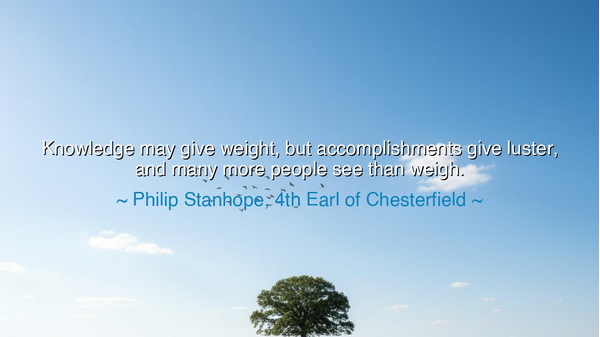
Knowledge may give weight, but accomplishments give luster, and
Knowledge may give weight, but accomplishments give luster, and many more people see than weigh.






“Knowledge may give weight, but accomplishments give luster, and many more people see than weigh.” — Philip Stanhope, 4th Earl of Chesterfield
In this elegant and timeless reflection, Philip Stanhope, the 4th Earl of Chesterfield, distills the wisdom of human nature and ambition into a single gleaming truth: that knowledge, though profound, lives quietly within, while accomplishment shines outward into the eyes of the world. Knowledge gives weight—substance, gravity, and foundation—to a person’s character. It is the stone upon which greatness is built. Yet accomplishment gives luster—it is the polished brilliance that draws attention, inspires admiration, and earns the recognition of others. Chesterfield understood that though depth is the soul of mastery, it is through deeds that the world perceives greatness, for as he says, “many more people see than weigh.” Most judge by appearances, few by essence.
The origin of this wisdom lies in Chesterfield’s own life and writings. An 18th-century statesman, diplomat, and man of letters, he is best remembered for his Letters to His Son—a collection of counsel intended to shape the young man into a figure of both intellect and elegance. Chesterfield lived in an age of courts and salons, where success depended not only on knowledge but on the grace to turn that knowledge into action. He had seen many men of learning live and die in obscurity, while those of lesser wisdom but greater skill in applying it rose to prominence. Hence his teaching: that learning alone is not enough. One must adorn it with accomplishment, polish it with character, and display it through purpose.
Knowledge, in its truest sense, is the foundation of inner strength. It deepens the mind, sharpens judgment, and steadies the soul. Yet knowledge unexpressed is like gold buried underground — precious, but unseen. The wise man knows that knowledge is not meant to be hoarded but to be used, translated into action, into works that benefit others and reveal the worth of the mind that conceived them. Chesterfield does not diminish knowledge; he glorifies its fulfillment. The weight of wisdom gives power and stability to action, while accomplishment—the living fruit of that wisdom—gives it light, movement, and immortality.
History offers us many mirrors for this truth. Consider Leonardo da Vinci, who united immense knowledge with dazzling accomplishments. His mind was a universe of study—anatomy, mathematics, engineering, philosophy—but he did not let that learning remain a private possession. Through his art, his inventions, and his discoveries, he gave the world not just the weight of genius, but the luster of creation. Thus, the generations that followed did not need to weigh the fullness of his mind; they saw its brilliance in the smile of the Mona Lisa and the majesty of The Last Supper. Da Vinci embodied Chesterfield’s wisdom: his knowledge gave him strength, but his accomplishments gave him glory.
Yet Chesterfield’s words also contain a subtle warning. He reminds us that “many more people see than weigh.” The world, he says, judges by what it beholds, not by what it understands. Few take the time to look deeply into the heart of wisdom; most are dazzled by its reflection. Thus, one must learn to balance the inner with the outer, the invisible depth with the visible act. A man of learning who never acts is overlooked; a man of deeds without depth is fleeting. The true sage joins the two—building his house of knowledge and adorning it with accomplishment.
There is, too, an element of compassion in Chesterfield’s wisdom. He understood that not every soul can measure the weight of knowledge, but nearly all can be inspired by the luster of achievement. A single act of courage, a single creation, a single good deed can awaken hearts where a thousand words might fail. Thus, those who possess understanding have a duty to transform it into light—into accomplishments that uplift others. The luster of one’s work becomes not vanity, but service; not pride, but legacy.
Therefore, dear seeker, let this be your lesson: cultivate knowledge as the roots of a tree, but let accomplishment be its branches and blossoms. Learn deeply, think clearly, but also act boldly. Let the weight of your understanding give strength to your actions, and let the luster of your deeds reveal the truth of who you are. For the world may not always weigh your wisdom, but it will see your light—and through that light, some may be moved to seek their own.
And so, remember Chesterfield’s eternal counsel: Knowledge may give weight, but accomplishments give luster. It is not enough to be wise in silence; one must let wisdom breathe, move, and shape the world. Be both scholar and doer. Let your mind be your anchor, your actions your sail. For in the balance between what is known and what is done lies the true art of greatness—and the radiance of a life that will not be forgotten.






AAdministratorAdministrator
Welcome, honored guests. Please leave a comment, we will respond soon